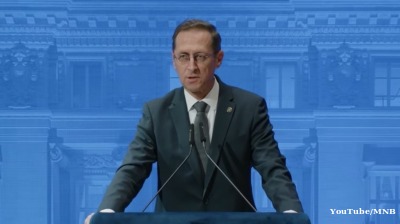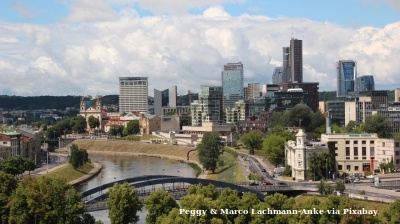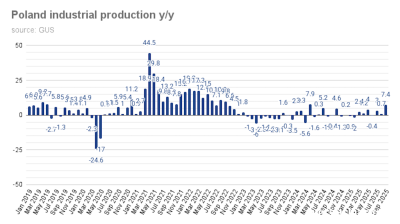Consumer price indices (inflation) in Czechia increased by 2.6% year on year, amid a spike in food prices, and decreased by 0.4% month on month in August.
An acceleration on the August 2.2% y/y inflation level was expected by market analysts and the September figure is tied for the second-highest monthly inflation this year. The Czech statisticians published the figure days after Czech Prime Minister Petr Fiala stated that the Czech economy is “out of the worst.”
“The y/y development of consumer prices in September was significantly influenced by the prices of food and fuels, just as in August,” commented Pavla Sediva of the Czech Statistical Office (CZSO).
“Prices of food increased y/y for the first time from last November,” Sediva also said, pointing to prices of UHT semi-skimmed milk, which were “higher by roughly 20% compared to last year,” and “butter [went up] by approximately 43% and chocolate products by 22%.”
Overall, prices of food and non-alcoholic beverages turned from a drop of 1.8% y/y in August to a rise by 0.6%, statisticians noted, with prices of fruit increasing by 2.8% (compared to a decrease of 2.4% in August), and vegetables by 3.1% (-2% in August).
The impactful sector of housing, water, electricity, gas and other fuels registered an increase in prices of actual rentals of 6.4% y/y, materials and services for maintenance and repair of the dwelling by 4%, water supply by 10.9%, sewage collection by 13.4%, electricity by 8.8% and heat and hot water by 6.9%. Prices of natural gas went down by 4.2% and prices of solid fuels by 0.9%.
Price development in the transport sector was influenced by an 11.2% y/y drop in prices of fuels and lubricants (-4.1% in August).
In m/m development, the sector of recreation and culture registered a fall in prices of package holidays by 20.9% as the summer season ended, and in the transport sector, prices of fuels and lubricants dropped by 4.8%. In the prices of food and non-alcoholic beverages, butter prices went up by 16%, skimmed milk by 14.1%, poultry by 4.1%, vegetables by 2.1% and fruit by 1.3%.
“An average price of petrol Natural 95 [at] CZK35.83 (€1.415) per litre was the lowest value from October 2021 and the average price of diesel [at] CZK34.22 per litre from July 2023,” statisticians also pointed out.
Speaking at an industrial fair, Fiala praised this year’s developments as the worst came to an end, saying that “last year inflation was 8.5%, now we are below 2%” and that “GDP grows at least a little.” He also criticised the EU’s Green Deal, urging it to be more “rational” and calling for “European politics to be more realistic,” saying this “will be challenging, but we have to try it.”
Analysts surveyed by Czech Television (CT) pointed to a high comparison base from last year when commenting on the September spike in inflation.
“Inflation is on the rise and for the rest of the year it will go up further. It can shortly even surpass the 3% borderline, that is the upper end of the toleration range around the inflation target,” Deloitte’s head economist David Marek was quoted as saying by CT, pointing to the 2% inflation target Czech National Bank (CNB) has vowed to pursue in its monetary policies.
Data

Hungary’s central bank leaves rates unchanged
National Bank of Hungary expects inflation to fall back into the tolerance band by early 2026, with the 3% target sustainably achievable in early 2027 under the current strict policy settings.

Germany slowdown weighs on Lithuania’s export-driven manufacturing sector
Lithuania’s economy remains highly sensitive to the industrial cycle in Germany, its third largest trade partner.

Chobani yoghurt king Hamdi Ulukaya becomes richest Turk
Knocks Murat Ulker into second place in Forbes ranking as his company's valuation leaps to $20bn.

.png)


